Wolfgang Engelhorn, director of the N Stufe initiative – one of the oldest integrative initiatives in the Egyptian educational sector – addressed an audience of several generations of directors, graduates and students at the commemoration of the 40th anniversary of the launch of N Stufe.
The event took place at the premises of the German School in Cairo on 20 November.
When it started, the N initiative aimed to give students aged around eight – from government schools across the country and whose families couldn’t otherwise afford it – a chance for a full scholarship to study in the German system if they pass tests in mathematics, IQ and Arabic.
"The transition these kids made until they excelled is amazing," German Ambassador to Egypt Julius Georg Luy, who was in the audience, told Ahram Online prior to the event.
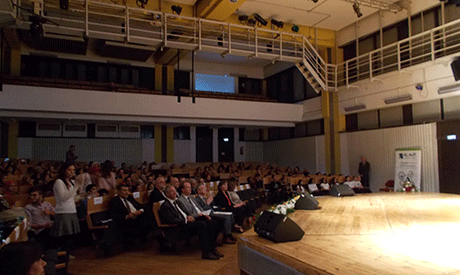
Audience at the Jubilee (Photo:Ahram Online)
Over four decades ago, an idea was formed to introduce a system that could give the academically-talented from across Egypt a chance to enter the advanced German education system.
By then, in the mid-1970s, the German Evangelical School in Cairo (DEO) had already been established for more than a century, making it the oldest German school and one of the oldest schools in Egypt. But something was still missing.
"It was already a very established and reputable educational institution, but unfortunately almost all the students belonged to a niche segment of society,” says Engelhorn.
"In a system that highly valued giving an equal opportunity to all, a change had to be introduced, and the idea of the N Stufe was born."
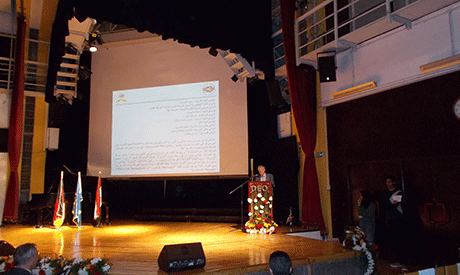
German Ambassador in Cairo ,Herr Julius Luy
The German ambassador says that education has always been a cornerstone in cooperation between Egypt and Germany, and that it will always hold this place of importance.
Later, the ambassador addressed the audience, hailing the success of the N initiative and emphasising that cooperation with the Egyptian Ministry of Education has been vital and should be acknowledged.
"I have no special talent. I am only passionately curious," DEO director Roland Harkan said, quoting famous German scientist Albert Einstein, as he emphasised the importance of an education that nurtures passion for understanding and creativity, often stalled in many educational systems.
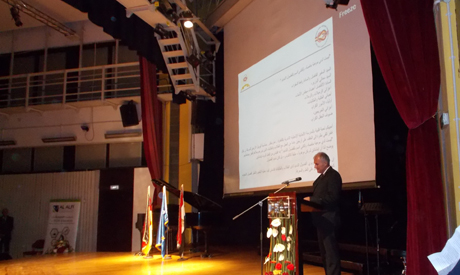
Herr Roland Harken
After the event, Ahram Online spoke to Nermin Abu Gazia, executive director of Al-Alfy Philanthropic Foundation, who shed light on the foundation's role in supporting free education opportunities for distinguished young Egyptian students.
"We have been providing free scholarships for Egyptian students in many fields for years, especially when it comes to excelling in science and technology. We have also been collaborating for some years with DEO to sponsor the education of a number of students through the N system. The change that we witness in those students, in terms of character, self-esteem and the quick grasp of the language, is remarkable," she said.
The Evangelical Church of Egypt was established in February 1864. Shortly after, the idea of establishing a school affiliated with the church was born.
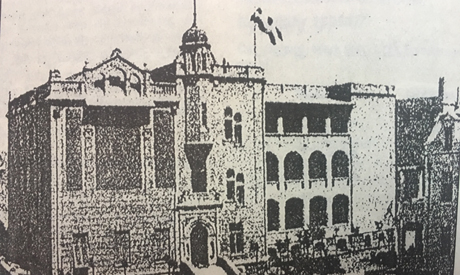
DEO,oldest building, ,Boulak,1908( photo:courtesy of DEO )
In the spring of 1873, the school was established by the Protestant congregation on a piece of land given to the Prussian consul von Theremin by Khedive Ismail.
Interestingly, the initial formal language of education was French, with only 15 students attending.
In 1878, after a dispute about the school’s ownership between the church and the school, the school became community-owned, and optional Arabic lessons were added in 1880.
Since then, the institution has expanded, moving from one location to another and undergoing various changes; surviving political upheavals that came along with two world wars, during which the school had to shut its doors before reopening later.
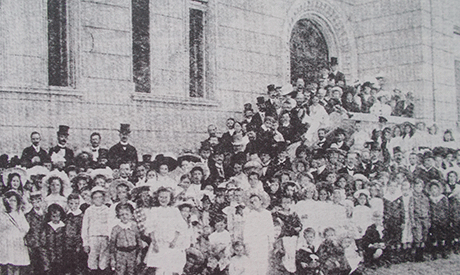
students at gate of Rifaii mosque, circa 1913, photo:courtesy of DEO
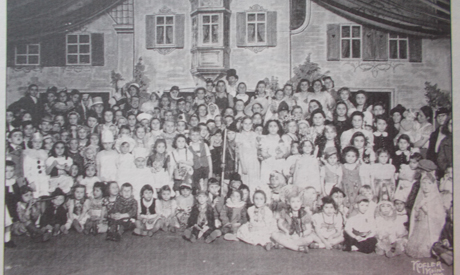
students in the 1930s (photo: courtesy of DEO)
The school has always maintained an identity that encompasses all nationalities and religions, encouraging free thought and creativity, and emphasising the importance of obtaining a solid Arabic education and the integration of charity and community work in all its activities.
The institution has been visited by many politicians over the years, including German Chancellor Willy Brandt in 1974, Helmut Schmidt in 1978, Egyptian President Anwar El-Sadat and his wife Jihan in 1981, and Germany's President Richard von Weizsäcker and Johannes Rau in 1984 and 2000 respectively.
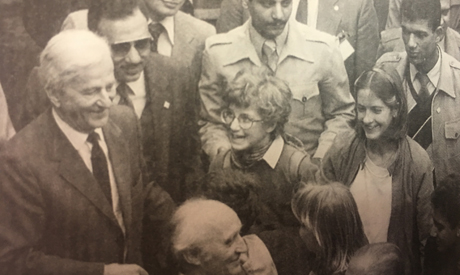
Germany's President s Richard von Weizsäcker visit ( photo: courtesy of DEO)
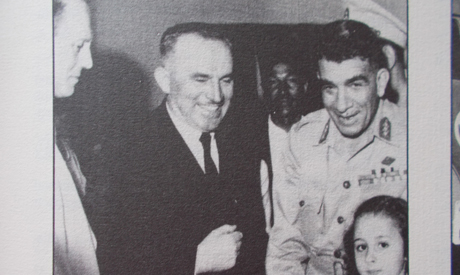
1st Egyptian president Naguib's visit in the 1950s (courtesy of DEO)
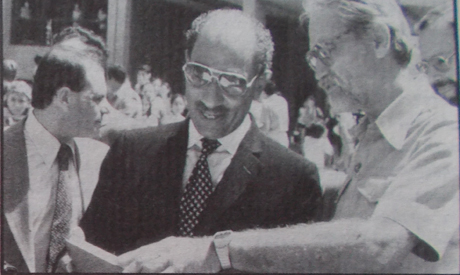
Sadat visit , 1981( Photo: courtesy of DEO)
The anniversary event honoured Auni Abder Rauf, who was appointed in 1959 as the school’s first Egyptian director, as well as professor Sayed Tag, dean of the Faculty of Engineering at Cairo University, and a number of other notable figures who are graduates of the N initiative in numerous fields.
Short link: